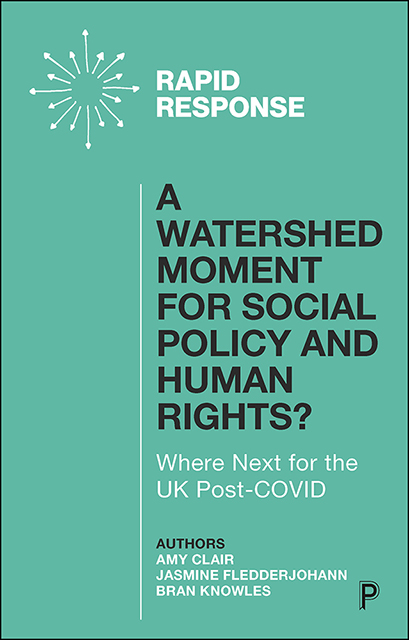5 - The right to necessary social services: Digital technology
Published online by Cambridge University Press: 21 April 2023
Summary
In the face of a deadly airborne virus, the world acted to limit the spread by rapidly shifting as much as possible toward digital practices. In the UK, people were instructed to stay home to save lives, barring limited exceptions delineated by the government, and homes were transformed into multifunction bunkers facilitating work, school, doctor appointments, and recreation. Customers competed for limited online shopping delivery slots. Retailers fought amongst each other for cardboard boxes to meet the massive surge in online retail shopping, with Amazon buying up most of the stock (Stokel-Walker, 2021). An array of digital offerings were produced to help parents navigate the challenges of homeschooling – Joe Wicks created daily PE lessons on YouTube; the BBC created BBC Bites and other educational tools; zoos became virtual, hosting educational sessions via Facebook. Streaming services such as Netflix and Amazon Prime became personal home cinemas. Birthday celebrations were hosted via Zoom. While life was far from ideal, for many, digital technologies were newly appreciated as enabling some semblance of normality while remaining safe.
At the same time, the benefits and harms of increased digitisation were far from equally distributed. The companies that survived the pandemic were those that were already digitised or offered products or services that were amenable to digitalisation – clothes and shoes retailers offered virtual fitting appointments; entertainers turned to video hosting and social media platforms to monetise virtual performances; farms began charging for video conferences with animals (BBC News, 2021). These adaptations were praised as a show of ‘resilience’; meanwhile other perfectly viable businesses pre-COVID suffered from their intrinsic materiality – airlines, food and drink establishments, salons, self-employed cleaners, local bookshops, high-street shops, newsagents and others – leaving many unemployed and facing serious financial hardship.
The real winner of 2020 was the tech sector itself (The Economist, 2020). Paid services gained subscribers, free services gained ad revenue, digital retailers gained customers, and tech start-ups plugged the need for digital solutions. After raking in obscene pandemic profits, these same companies paid little to no taxes to help a struggling middle class. USbased video conferencing software company, Zoom, saw profits increase by 4,000 per cent in 2020, yet paid $0 in taxes (ITEP, 2021). Amazon's profits increased by 51 per cent in 2020, but the now £20 billion company paid a tax ratio of 0.37 per cent (Sky News, 2021).
- Type
- Chapter
- Information
- A Watershed Moment for Social Policy and Human Rights?Where Next for the UK Post-COVID, pp. 75 - 96Publisher: Bristol University PressFirst published in: 2023



